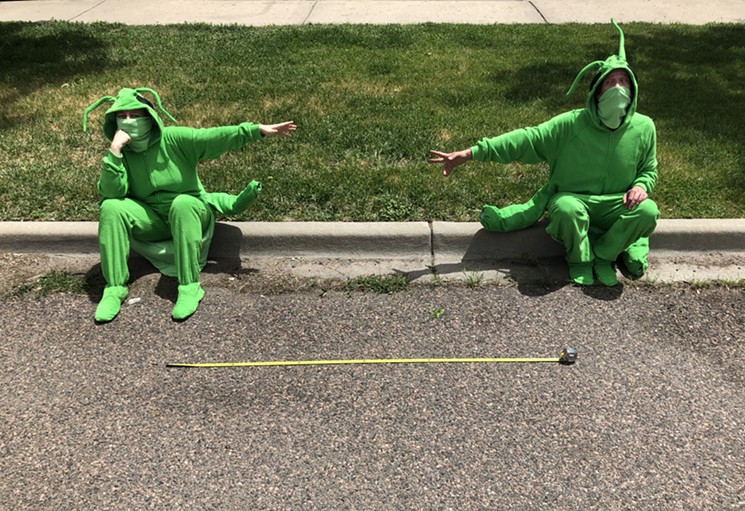The COVID-19 crisis has pummeled theater artists, who were already struggling to compete in a world of Netflix, Hulu and Amazon. Unique real-time experiences shared among actors and audience members have always been the theater’s selling point, but now those in-person experiences are shut down indefinitely. And while many local companies are helping their artists stay active and communicating with audiences through videos and performances over Zoom, most people are longing for something more immediate.
Amid the despair, Buntport Theater, one of Denver’s most cherished arts organizations, has found a way to pull off a live performance.
The Grasshoppers, described as a “short, funny twist on a nature documentary,” will be presented in the theater’s parking lot. The actors will be at least six feet from each other, and patrons will remain in their cars. “This is an experiment,” explains company member Brian Colonna.
But with Buntport, what isn’t?
Like all of the troupe’s productions, The Grasshoppers was created through a group process and inspired by a quirky, compelling fact that inspired one of the troupe’s members: Erin Rollman had read about a species of grasshopper that, because of changes in the environment, morphed into voracious swarms of locusts that infested the Rocky Mountain region beginning in 1875.
Homesteaders faced “a plague of biblical proportions,” says Colonna. “Obviously, it changed the lives and times, including growing practices. Religion was part of it, too; the way the government responded was part of it. You have these settlers experiencing a spiritual dilemma, wondering if they’re being punished by God. And the church had to walk a fine line between asserting ‘Yes, you are being punished’ and cursing the locusts.”
In this production, four actors play the grasshoppers. That’s not a hard thing to do, observes Colonna, since Buntporters have often taken on animal roles. He was a camel in The 30th of Baydak and a rat in Universe 92; in Jugged Rabbit Stew, Erik Edborg was a giant talking rabbit. And Rollman gave a melancholy performance as Io, the Goddess transformed into a cow, in two productions.
“Clearly, we have a problem,” observes Colonna, laughing.
Although the COVID-19 crisis isn’t mentioned directly, The Grasshoppers does address it: The play explores the juxtaposition as solitary insects become “a gregarious swarm burning through resources like fire,” says Colonna. The production also touches on the way the stay-at-home orders have helped heal our damaged environment, since nineteenth-century settlers noted that fields were often more fertile after a locust infestation.
The theme of separation and coming together is personal for the company, whose members had been working together almost daily since Buntport’s inception two decades ago.
“This week is the first time we’ve all been in the same place since the shutdown — six feet apart, with masks, but together,” says Colonna. “Before that, all the work was online and on Zoom. Just having a rehearsal felt like a revelation. You can’t interrupt anyone on Zoom; it reins in conversations. And we talked today about connecting with the audience, also, letting them know you’re interacting with them and seeing them.”
While the future of Denver theater is unclear, Buntport may be better equipped to weather the crisis than some groups. The company has a devoted audience, strong connections with other local institutions, and an understanding landlord — though he, too, faces financial uncertainty, Colonna notes. Buntport has saved some money over the years, and has a history with large funders. The nonprofit received a small business loan in the first stimulus round, and the Bonfils-Stanton Foundation allocated funds. Members have taken pay cuts, but they are still receiving checks.
“Right now we are able to continue to have our jobs, which is a privilege,” says Colonna. “It’s been amazing, people coming together to support us. We are also a small company that can change course relatively quickly. We are planning to be able to sustain even if we cannot be fully operational for another year or more.”
In August, The Grasshoppers will take on new life with the release of a video companion piece created in collaboration with Fannypack Films and artist Adam Stone. This is part of the 3×3 Projects initiative created by the Fine Arts Center at Colorado College, which has funded seven projects exploring creative collaborations during the stay-at-home order.
“Still, it’s a big problem,” Colonna concedes. “There’s no revenue in terms of ticket sales, and no knowing when people will be able to come together again. But the bedrock for us has been the community and being here twenty years. We’re still here. We’re hanging in. And we’ll see what happens.”
-Juliet Wittman May, 26th 2020 Westword
